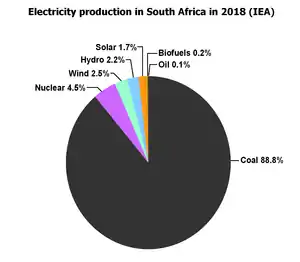Electricity sector in South Africa
The Electricity sector in South Africa is an important part of the economy in the region. Eskom is the state-owned electricity provider.[2] A 2016 study compared long term prices of different types of new powerplants.[3]

Electricity production
In 2018, coal was responsible for 88.8% of electricity production, so the carbon intensity of electricity generation is higher than most other countries at over 800 gCO2/kWh.[4]
Nuclear was the second most important single source of electricity production, at 4.5%. South Africa has two commercial nuclear reactors, at Koeberg nuclear power station.
6.6% of electricity production came from renewables (wind power, hydropower, solar power, and to a smaller degree biofuels), while oil provided less than 0.1%.[5]
Eskom
Eskom is a South African electricity public utility, established in 1923 as the Electricity Supply Commission (ESCOM) and also known by its Afrikaans name Elektrisiteitsvoorsieningskommissie (EVKOM), by the government of the Union of South Africa in terms of the Electricity Act (1922). Eskom represents South Africa in the Southern African Power Pool. The utility is the largest producer of electricity in Africa,[6][7] is among the top seven utilities in the world in terms of generation capacity and among the top nine in terms of sales. It is the largest of South Africa's state owned enterprises. Eskom operates a number of notable power stations, including Kendal Power Station, and Koeberg nuclear power station in the Western Cape Province, the only nuclear power plant in Africa. The company is divided into Generation, Transmission and Distribution divisions and together Eskom generates approximately 95% of electricity used in South Africa.
References
- https://www.iea.org/data-and-statistics/data-tables/?country=SOUTHAFRIC&energy=Electricity&year=2018
- OECD, African Development Bank, United Nations Economic Commission for Africa (4 Dec 2009). African Economic Outlook 2009 : Country Notes: Volumes 1 and 2. OECD Publishing. p. 583. ISBN 9789264076181. Retrieved 20 September 2013.CS1 maint: multiple names: authors list (link)
- http://www.ee.co.za/wp-content/uploads/2016/10/New_Power_Generators_RSA-CSIR-14Oct2016.pdf
- Electric Insights Quarterly (PDF) (Report).
- https://www.iea.org/data-and-statistics/data-tables/?country=SOUTHAFRIC&energy=Electricity&year=2018
- Dana Sanchez. "Which Countries Produce And Consume Most Electricity In Africa?". Retrieved 28 October 2014.
- http://www.indexmundi.com/g/r.aspx?v=79&t=100